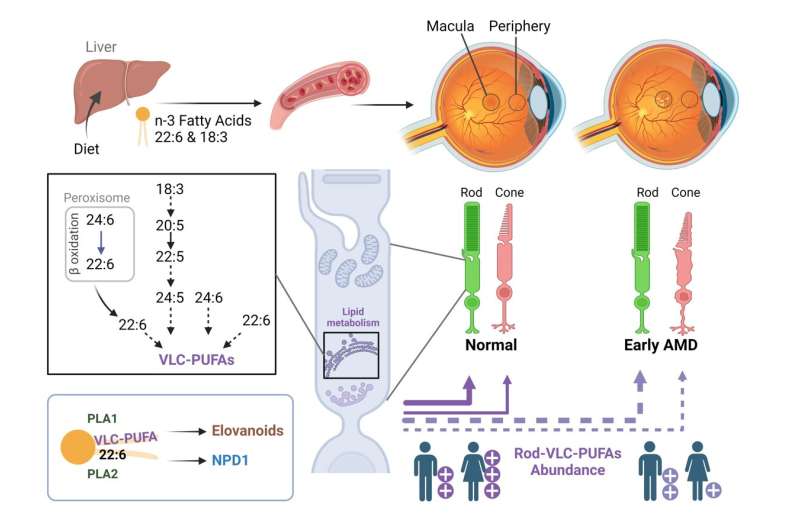This article has been reviewed according to Science X's editorial process and policies. Editors have highlighted the following attributes while ensuring the content's credibility:
fact-checked
trusted source
proofread
Researchers discover a key failure in AMD that may lead to progression and vision loss

Research led by Nicolas Bazan, MD, Ph.D., Boyd Professor, Ernest C. and Yvette C. Villere Chair for the Study of Retinal Degeneration, and Director of the Neuroscience Center of Excellence at LSU Health New Orleans School of Medicine, suggests that age-related macular degeneration (AMD) decreases an essential fatty acid, preventing the formation of a class of protective molecules and reducing repair potential. The discovery may also open new therapeutic avenues for AMD. The findings are published in Experimental Eye Research.
The study shows that AMD decreases peripheral retinal docosahexaenoic acid (DHA) 22:6 in rod photoreceptor cells, limiting the elongation of fatty acids to form very-long-chain polyunsaturated fatty acids (VLC-PUFAs). VLC-PUFAs are precursors of elovanoids, bioactive chemical messengers made from omega-3 very- long-chain polyunsaturated fatty acids.
Elovanoids, discovered by the Bazan lab, have been shown to restore the structure and integrity of damaged photoreceptor cells by repairing, remodeling and regenerating healthy cells. The loss of the neuroprotective precursors of elovanoids in the retina periphery from AMD facilitates uncompensated stress and cell loss.
"Biosynthetic fatty acid pathway insufficiencies may be a fundamental factor in the onset and progression of macular degenerative diseases leading to blindness," notes Dr. Bazan. "These findings open important immediate avenues for therapeutic exploration for AMD."
The research team also found major differences between genders. According to the National Institutes of Health, 66% of AMD-affected persons are female. Females have higher DHA 22:6 than males because of estrogen effects. As they age and estrogen decreases, so does DHA 22:6, and as a result, women can become increasingly susceptible to retinal degeneration.
"In AMD, the female retina loses peripheral rod VLC-PUFAs to about 33% less than in males, limiting elovanoid formation and its protective bioactivity," adds Bazan.
According to the Bright Focus Foundation, nearly 20 million US adults have some form of age-related macular degeneration. An estimated 18 million people aged 40 and older were living with early-stage macular degeneration in 2019, and 1.49 million had late-stage macular degeneration. Around 200 million people worldwide are thought to be living with AMD, a number expected to reach 288 million by 2040.
Age is a prominent risk factor for age-related macular degeneration. The risk of getting advanced age-related macular degeneration increases from 2% for those ages 50–59, to nearly 30% for those over the age of 75. The direct health care costs of visual impairment due to age-related macular degeneration in the U.S., Canada, and Cuba are estimated at $98 billion.
Other authors of the study include Drs. William Gordon, Marie-Audrey Kautzmann, and Bok Kyoo Jun, along with Megan Cothern at LSU Health New Orleans' Neuroscience Center of Excellence and Dr. Zhide Fang at LSU Health New Orleans School of Public Health.
More information: William C. Gordon et al, Rod-specific downregulation of omega-3 very-long-chain polyunsaturated fatty acid pathway in age-related macular degeneration, Experimental Eye Research (2023). DOI: 10.1016/j.exer.2023.109639



















